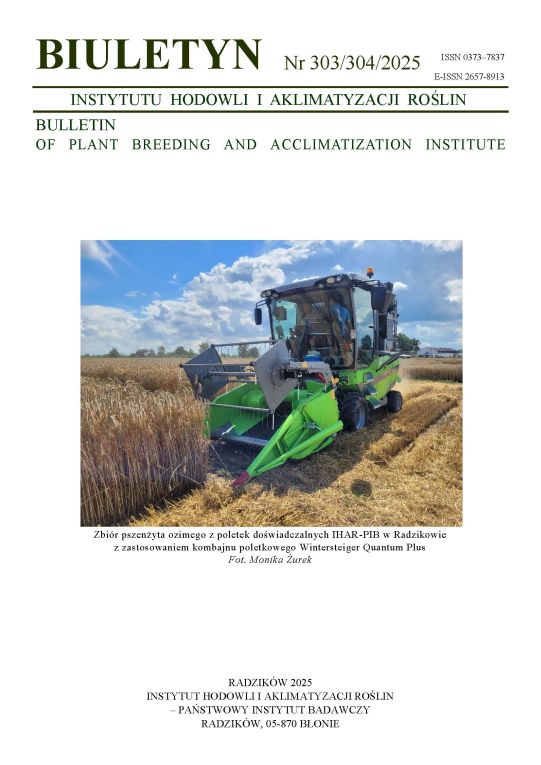Identification of factors determining winter wheat and winter triticale overwintering under Polish winter conditions
Marcin Rapacz
rrrapacz@cyf-kr.edu.plUniwersytet Rolniczy w Krakowie (Poland)
Barbara Jurczyk
Uniwersytet Rolniczy w Krakowie (Poland)
Monika Sasal
Uniwersytet Rolniczy w Krakowie (Poland)
Supporting Agencies
Prace zostały wykonane w ramach badań podstawowych na rzecz postępu biologicznego w produkcji roślinnej na podstawie decyzji Ministra Rolnictwa i Rozwoju Wsi nr HoR.hn.802.8.2018, Zadanie 11.
Keywords:
fluorescencja chlorofilu, mrozoodporność, rozhartowywanie, zimotrwałość, zmiany klimatyczneReferences
Rapacz M., Jurczyk B., Sasal M. 2017. Deacclimation may be crucial for winter survival of cereals under warming climate. DOI:10.1016/j.plantsci.2016.11.007. Plant Sci. 256: 5 — 15.
Waalen W. M., Tanino K. K., Olsen J. E., Eltun R., Rognli O. A., Gusta L. V. 2011. Freezing Tolerance of Winter Canola Cultivars is Best Revealed by a Prolonged Freeze Test. DOI:10.2135/cropsci2011.02.0098. Crop Sci. 51: 1988 — 1996.
Waalen W., Øvergaard S. I., Åssveen M., Eltun R., Gusta L. V. 2013. Winter survival of winter rapeseed and winter turnip rapeseed in field trials, as explained by PPLS regression. DOI:http://dx.doi.org/10.1016/j.eja.2013.06.004. Eur. J. Agron. 51: 81 — 90. Google Scholar
Waalen W. M., Tanino K. K., Olsen J. E., Eltun R., Rognli O. A., Gusta L. V. 2011. Freezing Tolerance of Winter Canola Cultivars is Best Revealed by a Prolonged Freeze Test. DOI:10.2135/cropsci2011.02.0098. Crop Sci. 51: 1988 — 1996.
Waalen W., Øvergaard S. I., Åssveen M., Eltun R., Gusta L. V. 2013. Winter survival of winter rapeseed and winter turnip rapeseed in field trials, as explained by PPLS regression. DOI:http://dx.doi.org/10.1016/j.eja.2013.06.004. Eur. J. Agron. 51: 81 — 90. Google Scholar
Rapacz, M. ., Jurczyk, B. . and Sasal, M. . (2019) “Identification of factors determining winter wheat and winter triticale overwintering under Polish winter conditions”, Bulletin of Plant Breeding and Acclimatization Institute, (286), pp. 27–30. doi: 10.37317/biul-2019-0005.
Authors
Barbara JurczykUniwersytet Rolniczy w Krakowie Poland
Authors
Monika SasalUniwersytet Rolniczy w Krakowie Poland
Statistics
Abstract views: 2553PDF downloads: 314
License

This work is licensed under a Creative Commons Attribution-ShareAlike 4.0 International License.
Upon submitting the article, the Authors grant the Publisher a non-exclusive and free license to use the article for an indefinite period of time throughout the world in the following fields of use:
- Production and reproduction of copies of the article using a specific technique, including printing and digital technology.
- Placing on the market, lending or renting the original or copies of the article.
- Public performance, exhibition, display, reproduction, broadcasting and re-broadcasting, as well as making the article publicly available in such a way that everyone can access it at a place and time of their choice.
- Including the article in a collective work.
- Uploading an article in electronic form to electronic platforms or otherwise introducing an article in electronic form to the Internet or other network.
- Dissemination of the article in electronic form on the Internet or other network, in collective work as well as independently.
- Making the article available in an electronic version in such a way that everyone can access it at a place and time of their choice, in particular via the Internet.
Authors by sending a request for publication:
- They consent to the publication of the article in the journal,
- They agree to give the publication a DOI (Digital Object Identifier),
- They undertake to comply with the publishing house's code of ethics in accordance with the guidelines of the Committee on Publication Ethics (COPE), (http://ihar.edu.pl/biblioteka_i_wydawnictwa.php),
- They consent to the articles being made available in electronic form under the CC BY-SA 4.0 license, in open access,
- They agree to send article metadata to commercial and non-commercial journal indexing databases.
Most read articles by the same author(s)
- Iwona Żur, Ewa Dubas, Sabina Malaga, Franciszek Janowiak, Anna Janeczko, Marcin Rapacz, Tomasz Hura, Piotr Waligórski, Agnieszka Ostrowska, Magdalena Wójcik-Jagła, Identification of factors which determine drought and freezing tolerance in barley (Hordeum vulgare L.) , Bulletin of Plant Breeding and Acclimatization Institute: No. 286 (2019): Special issue













